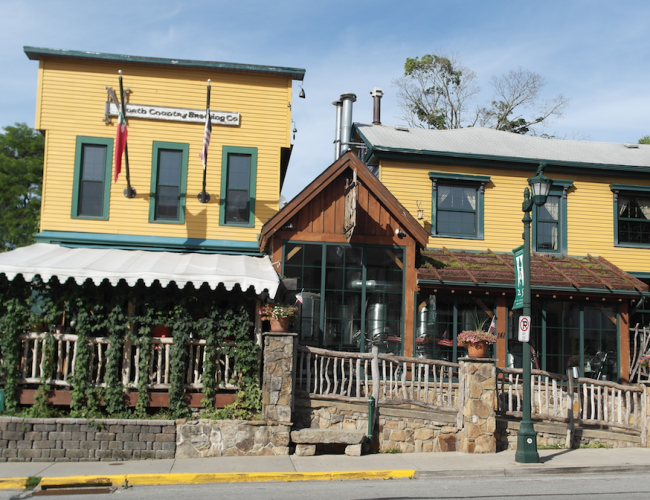Farm-to-fork, and even more recently, brewery-to-fork, are buzzwords tossed around in the local food and craft beer movements. It seems that weekly we hear of another brewery offering their spent grains to local ranchers or a restaurant launching around the idea of sourcing locally.
Both are positive products that many argue were born out of both the Great Recession and the food allergy epidemic that is plaguing our youth. We as a country are finally learning that eating and drinking local is essential for both a healthy lifestyle and a healthy economy. For North Country Brewing Co., a brewpub in Slippery Rock, Penn., neither concept is a trend.
Before Brewery-to-Fork was Cool
Brewpub owners Jodi and Bob McCafferty have been locally sourcing ingredients for the rural brewpub’s scratch kitchen since the brewery opened in 2005. Most of those ingredients came from the couple’s own farming initiatives. The McCafferties rented two separate farms after the brewpub opened and eventually purchased their own farm, North Country Harvesting.
In the early days, The McCafferties composted all of the restaurant’s plate scraps on the farm and turned the kitchen prep waste into fertilizer. When North Country Harvesting opened, the couple moved beyond just growing produce and began to raise Tamworth pigs, Leicester long wools, Bourbon Red turkeys, Khaki Campbell ducks, and Ameraucana chickens. All of which not only appear on the brewpub’s menu, but also help relieve brewpub waste. “The cattle eat all of our spent grains, and the pigs now take care of all the kitchen prep waste,” says Bob.
The McCafferties are encouraged that other restaurants and breweries are moving in on both the farm-to-fork and brewery-to-fork concepts. “We think it’s great! We’re glad there are more freaks out there like us. Really, though, we are happy that they aren’t just words anymore but a chosen lifestyle that makes sense to many,” states Bob.
Farm-to-Glass Beers
North Country’s beers are just as inspired by the local farm movement as the brewpub’s kitchen menu. North Country’s Lavender Abbey Ale is laced with lavender flowers from North Country Harvesting. Bob and Jodi handpick blueberries for the Blueberry Sour Beer, harvest Scottish Heather for the Heather Ale, and collect maple syrup for the Copper Kettle Ale. The McCafferties also grow 10 varieties of hops.
When they can’t produce it on the farm, they often look to other local food producers. For example, honey for the Slippery Rock Dew comes from the Lutz Farm. However, Bob doesn’t necessarily feel that the beers are farm inspired. Instead, North Country alters the style to the customer’s tastes. “We have brewed over 120 variations and styles of beers over the years, and have let the customers decide which ones we should keep bringing back, and which ones we offer as our flagships and seasonals.”
Sustainability at Their Core
The sustainability initiatives don’t end with growing and sourcing local ingredients for their kitchen and brewery. The initiatives started with the renovated building that North Country Brewing calls home. The building itself has been in use since 1805. During the building’s long legacy, it served as an inn, a bar, a cabinetmaker, a coffin maker, a funeral home and a furniture store.
The McCafferties took ownership of the building in 1998 and spent eight years renovating the building before opening as a brewpub. During the renovations, the building was also their home. In the beginning, it was merely a wooden tent before the second-floor apartment was built.
The couple paid special attention to using materials they had on hand for most of the construction. “All of the duct work, drains, draft lines, and footers for the new foundations were hand dug through the glacial till that Slippery Rock sits on. The rounded cobbles that we stacked up from those holes now make the top chimney of the back patio. The dressed stones on the back patio came from the original foundations that needed replacing. When we were putting the handicap ramp in the front of the pub, we lifted the slate sidewalk up and made the back patio bar out of that stone,” says Bob. “The watering can I always tripped over is now the women’s room faucet.” In addition, most of the wood came from timber Bob collected on archeology digs from his day job.
The sustainability message that the McCafferties preach formed the decision to utilize cans instead of bottles. “We picked cans as our packaging vessel for sustainable reasons as well,” says Bob. “Less energy to recycle, and you can crush them into your recycle bins so your neighbors don’t talk.”
The Future of North Country Brewing
Bob and Jodi’s goal with the North Country Brewing is to grow “well, not big.” Thus, you can only find North Country’s beers in Pennsylvania and Ohio, with Florida coming on board soon.
The couple’s purchase of Harmony Inn adds an interesting twist to the McCafferty’s story. The restaurant and bar was Butler County’s first beer bar. Bob and Jodi plan to add to the Harmony Inn’s notoriety by installing 30 new taps.
Additional growth may come outside of craft beer, but will still maintain the same sustainable, community initiative that is at North Country Brewing’s core. Bob says that there’s “no coincidence our canning line came to us with a pot still.”
 Bryan Richards is a craft beer, food and travel writer. He’s followed his taste buds across five continents, 20 countries, and 71 cities. When he’s not traversing the globe, he enjoys the craft beer scene in his hometown of Charlotte, N.C., and experimenting in the kitchen with his wife. He’s also the author of The Wandering GourmandOpens in new window, a culinary and craft beer travel blog.
Bryan Richards is a craft beer, food and travel writer. He’s followed his taste buds across five continents, 20 countries, and 71 cities. When he’s not traversing the globe, he enjoys the craft beer scene in his hometown of Charlotte, N.C., and experimenting in the kitchen with his wife. He’s also the author of The Wandering GourmandOpens in new window, a culinary and craft beer travel blog.
CraftBeer.com is fully dedicated to small and independent U.S. breweries. We are published by the Brewers Association, the not-for-profit trade group dedicated to promoting and protecting America’s small and independent craft brewers. Stories and opinions shared on CraftBeer.com do not imply endorsement by or positions taken by the Brewers Association or its members.


Share Post